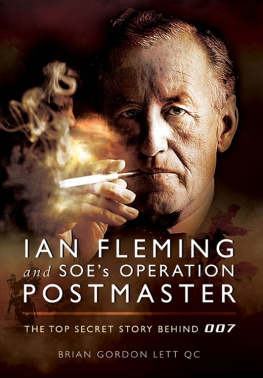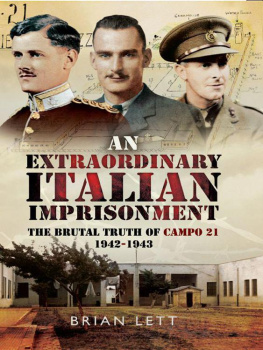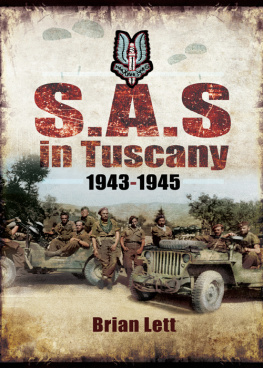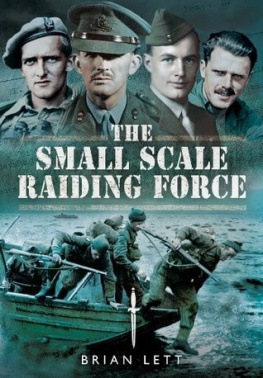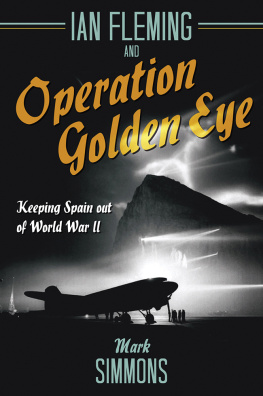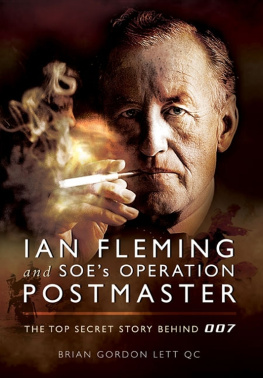Brian Lett - Ian Fleming and SOE’s Operation Postmaster
Here you can read online Brian Lett - Ian Fleming and SOE’s Operation Postmaster full text of the book (entire story) in english for free. Download pdf and epub, get meaning, cover and reviews about this ebook. year: 2013, publisher: Pen and Sword, genre: Detective and thriller. Description of the work, (preface) as well as reviews are available. Best literature library LitArk.com created for fans of good reading and offers a wide selection of genres:
Romance novel
Science fiction
Adventure
Detective
Science
History
Home and family
Prose
Art
Politics
Computer
Non-fiction
Religion
Business
Children
Humor
Choose a favorite category and find really read worthwhile books. Enjoy immersion in the world of imagination, feel the emotions of the characters or learn something new for yourself, make an fascinating discovery.
- Book:Ian Fleming and SOE’s Operation Postmaster
- Author:
- Publisher:Pen and Sword
- Genre:
- Year:2013
- Rating:3 / 5
- Favourites:Add to favourites
- Your mark:
- 60
- 1
- 2
- 3
- 4
- 5
Ian Fleming and SOE’s Operation Postmaster: summary, description and annotation
We offer to read an annotation, description, summary or preface (depends on what the author of the book "Ian Fleming and SOE’s Operation Postmaster" wrote himself). If you haven't found the necessary information about the book — write in the comments, we will try to find it.
Ian Fleming and SOE’s Operation Postmaster — read online for free the complete book (whole text) full work
Below is the text of the book, divided by pages. System saving the place of the last page read, allows you to conveniently read the book "Ian Fleming and SOE’s Operation Postmaster" online for free, without having to search again every time where you left off. Put a bookmark, and you can go to the page where you finished reading at any time.
Font size:
Interval:
Bookmark:
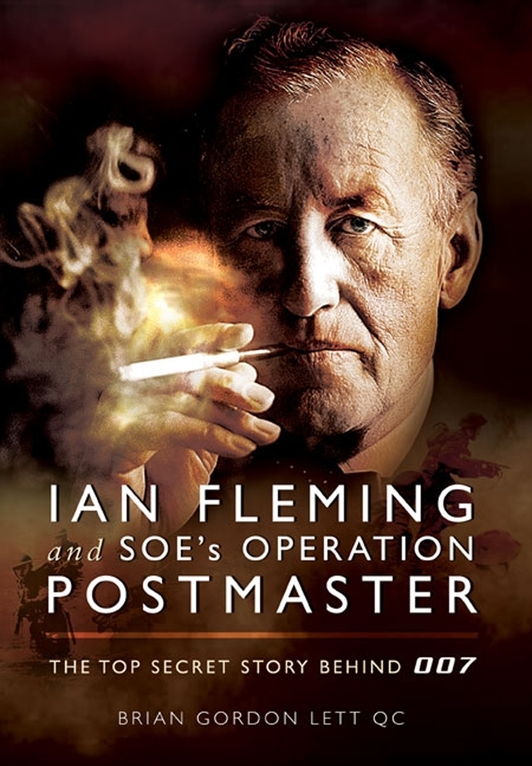
www.brianlettauthor.com
SAS in Tuscany 1943 45
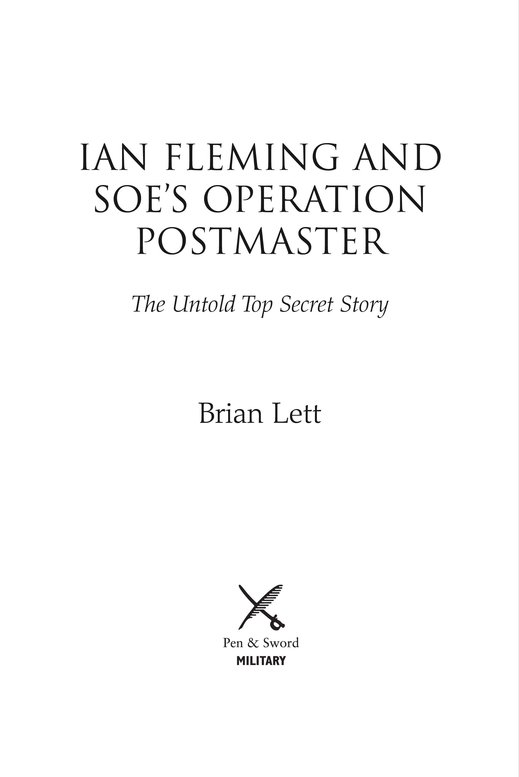
First published in Great Britain in 2012 by
PEN & SWORD MILITARY
an imprint of
Pen and Sword Books Ltd
47 Church Street
Barnsley
South Yorkshire S70 2AS
Copyright Brian Lett, 2012
9781783030798
The right of Brian Lett to be identified
as the author of this work has been asserted by him in accordance
with the Copyright, Designs and Patents Act 1988.
A CIP record for this book is available from the British Library.
All rights reserved. No part of this book may be reproduced or transmitted in any form or by any means, electronic or mechanical including photocopying, recording or by any information storage and retrieval system, without permission from the Publisher in writing.
Printed and bound in England
CPI Group (UK) Ltd, Croydon, CR0 4YY
Typeset in Times New Roman by
L S Menzies-Earl
Pen & Sword Books Ltd incorporates the imprints of
Pen & Sword Aviation, Pen & Sword Family History, Pen & Sword Maritime,
Pen & Sword Military, Pen & Sword Discovery, Wharncliffe Local History,
Wharncliffe True Crime, Wharncliffe Transport, Pen & Sword Select,
Pen & Sword Military Classics, Leo Cooper, Remember When,
The Praetorian Press, Seaforth Publishing and Frontline Publishing
For a complete list of Pen and Sword titles please contact
Pen and Sword Books Limited
47 Church Street, Barnsley, South Yorkshire, S70 2AS, England
E-mail: enquiries@pen-and-sword.co.uk
Website: www.pen-and-sword.co.uk
This is the true story of Ms Secret Service, and of his Secret Agents who were licensed to kill. Every event that is described in this book is true. All direct speech is taken from contemporaneous accounts recorded by the participants.
The code names of M and his agents are regularly used throughout this book. They are taken from the written records made at the time. For ease of reference, their real names are listed here:
| W.01 | Captain Gustavus March-Phillipps |
| W.02 | Lieutenant Geoffrey Appleyard |
| W.03 | Lieutenant Graham Hayes |
| M | Brigadier Colin McVean Gubbins |
| Caesar | Lieutenant Colonel Julius Hanau |
| W | Lieutenant Colonel Louis Franck |
| W4 | Major Victor Laversuch |
| W 10 | Lieutenant C.A. Leonard Guise |
| W25 | Captain Richard Lippett |
| W30 | Captain Desmond E. Longe |
| W39 | Major L.H. Dismore |
| W51 | B. Godden |
| W53 | Peter Ivan Lake |
For Julian, Robin, Stephanie and Toby
Gus March-Phillipps and Geoffrey Appleyard on the Maid Honor
Major Gus March-Phillipps, DSO, MBE
Major Geoffrey Appleyard, MC and Bar
Captain Graham Hayes, MC
Major Anders Lassen, VC, MC and two Bars
Matre Andr Desgranges, CGM
Major Victor Laversuch, OBE
Captain Peter Lake, MC, Legion dHonneur, Croix de Guerre
Lieutenant Colonel Leonard Henry Dissy Dismore, OBE, TD
Photograph of the Maid Honor , with portraits of Appleyard, Desgranges and March-Phillipps superimposed
The Duchessa dAosta and the Likomba at their moorings in Santa Isabel Harbour
Santa Isabel Harbour, November 1941, photographed by Vice Consul Michie from Pilot Alacons plane
Tracing showing relevant buildings and features on the above photograph, prepared by SOE for Operation Postmaster briefings
The Duchessa dAosta at her mooring in front of the Cathedral Square, Santa Isabel, photographed by Vice Consul Michie from Pilot Alacons plane
Tracing showing relevant buildings including the Chaplains house from which the all-important Go ahead signal was to be given, taken from a similar but poor quality photograph prepared by SOE for Operation Postmaster briefings
Photograph of the Duchessa dAosta at anchor, photographed covertly from the land Nautical map of Santa Isabel Harbour, with the depths marked, and the Duchessa dAosta and Likomba [tugs]
Wartime map of West Africa
The headquarters building of SOE, 64 Baker Street, as it is in modern times
Plaque to SOE at 64 Baker Street
Military identity card of Major General Sir Colin McVean Gubbins, M
Lieutenant Colonel Julius Hanau, OBE, Caesar
General Sir George Giffard, KCB, DSO, who was SOEs problem in West Africa
General William J. Donovan, DSC, DSM, head of the OSS, which later became the CIA
Ms telegram to Agent W.01 (March-Phillipps) via Agent W4 (Laversuch), 10 January 1942
W.01s telegram to M in reply, sent by W4 on 12 January 1942 after Operation Postmaster had departed
The Maid Honor under sail before the war
A Vauxhall Velox 30/98 Tourer, one of the fastest cars of its day. Appleyard described the one that March-Phillipps owned as terrific
A sleeve gun, a murder weapon available to Ms agents, as advertised in their secret catalogue
Exploding briefcases and cigarettes depicted here were two of a wide variety of devices on offer to Ms agents in the catalogue. Others included explosive tyre busters, itching powder, underwater swimming suits, silenced Sten machine guns and thumb knives
M with the authors father, Major Gordon Lett, DSO, representing SOE at Dachau Concentration Camp in 1964
On the morning of 10 January 1942, M sent a telegram to agent W.01 from his office at 64 Baker Street, the large grey building near Regents Park as Ian Fleming was later to call it in his James Bond novels. For all M knew, the telegram might be the last communication that he would ever have with agent W.01. It read:
Good hunting. Am confident you will exercise utmost care to ensure success and obviate repercussions. Best of luck to you and all MH and others. M.
In the early hours of the following day, W.01 and his Maid Honor Force (the MH in the telegram) were due to leave Lagos, Nigeria, to embark upon the most daring wartime operation yet mounted by Ms Secret Service, the Special Operations Executive (SOE). It was intended as a totally deniable operation, but in reality if it went wrong, or if any member of Maid Honor Force was captured, the repercussions at international level were likely to be very damaging. Failure and exposure might even persuade Spain and other neutral countries to enter the war alongside the Axis powers, Germany and Italy. Ms team, with the assistance of Commander Ian Fleming and Admiralty Intelligence, had of course prepared a cover story against each eventuality, success or failure, but if anything like the truth came out the stories would achieve little.
It was because of this risk, and because of the difficulty of the operation itself, that Operation Postmaster had been so long in the planning. M had been looking at the intended targets of the raid, two enemy ships moored in the neutral port of Santa Isabel in West Africa, for over a year. Maid Honor Force itself had been set up in the late spring of 1941, when M already had the possibility of a raid on Santa Isabel in mind. But it had taken very considerable efforts by M and Louis Franck, his head of station in Lagos, West Africa (known as W), and by Commander Ian Fleming, to persuade the Admiralty and the Foreign Office to give their consent. Indeed, full consent had only finally been forthcoming at the very end of December 1941. Eventually, M had been so short of time that even now, as he sent his final telegram to Agent W.01 and the Maid Honor Force, he still did not know all of those who were to form the complement of men that would take part in Operation Postmaster.
Font size:
Interval:
Bookmark:
Similar books «Ian Fleming and SOE’s Operation Postmaster»
Look at similar books to Ian Fleming and SOE’s Operation Postmaster. We have selected literature similar in name and meaning in the hope of providing readers with more options to find new, interesting, not yet read works.
Discussion, reviews of the book Ian Fleming and SOE’s Operation Postmaster and just readers' own opinions. Leave your comments, write what you think about the work, its meaning or the main characters. Specify what exactly you liked and what you didn't like, and why you think so.

